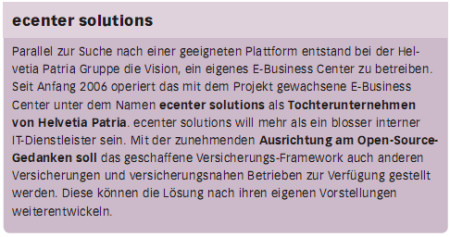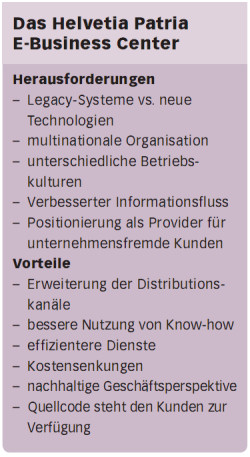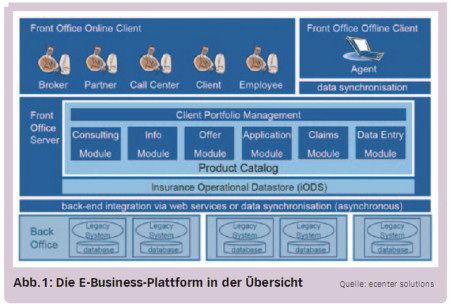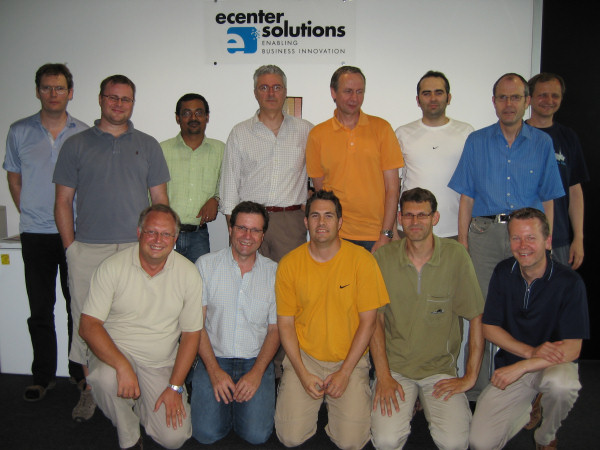[via InformationWeek]
 Some very interesting insights from Charles Babcock about the difference between developpers from the open source community and normal Corporate programmers. This article also tries to explain why companies, although they are using massively open source components, are not contributing back to the open source community.
Some very interesting insights from Charles Babcock about the difference between developpers from the open source community and normal Corporate programmers. This article also tries to explain why companies, although they are using massively open source components, are not contributing back to the open source community.
Status quo
[…] This spirit of volunteerism is alive and well in the world of open source software. Thousands of people donate their time and expertise to the benefit of all. But not everyone is giving as much as they’re getting. Large companies, those with the greatest wherewithal to help, are surprisingly minor players in the roll-up-your-sleeves work of open source development.
Big companies are “great consumers of open source. They’re very good at pushing the limits of what open source code can do,” says Carl Drisko, leader of the data center consulting practice at Novell, which distributes SUSE Linux. But when it comes to pounding out code, Drisko says, “they don’t have a lot of people contributing back.” […]
More than 10,000 people have made contributions to Linux alone in the past 10 years. […]
More than 100,000 projects are under way on the SourceForge.net open source site, ranging from the Stellarium desktop planetarium to the Pentaho business intelligence system. […]
But business participation is the exception rather than the rule. The Open Source Development Lab, one of the leading groups behind Linux, has seen its membership triple to 86 organizations over the past two years. All but 8% of those members come from companies that sell technology or from educational institutions. Among the exceptions are Bank of America, Credit Suisse, Goldman Sachs, and Google.[…]
Only a fraction of open source software is written by people paid to write it, usually programmers working for companies that have a direct interest in a project. Hewlett-Packard, IBM, Red Hat, and Sun Microsystems all sponsor such programmers. But they’re a tiny minority. Out of 250 contributors to the PostgreSQL open source database, only seven are paid for that work. The Subversion project had about 200 contributors last year, and only 10 were paid to work on the software. […]
Some factors to explain the “non-participation”
But contributions from businesses are small, partly because of a cultural divide between the open source crowd and corporate software developers, says Brian Behlendorf, co-founder of the Apache Web Server project and CTO at software company CollabNet. In contrast to the bottom line business world, Behlendorf says, open source developers exhibit a “willingness to challenge authority, the passion to work on an interesting problem well past the end of the workday, and the time and space to be able to build the right solution to a problem rather than just the most expedient.”
That highlights one reason some companies aren’t contributing to open source: They want to maintain rights to the software they develop, something they must give up under the General Public License that governs the use and distribution of much open source. Any new twist they might bring to an open source application would become available to competitors.
Workload is a factor, too. Managers reason that if their IT staffers have time to contribute to an open source project, they don’t have enough “real” work to do.
Conclusion
Open source programmers make their mark “with thoroughness, tenacity, a desire to solve interesting problems, an ability to take criticism, and they communicate well,” Momjian says. While such attributes are common in the business world, they don’t necessarily exist in the right blend to survive the rigors of an open source project. “Eighty percent of corporate developers won’t have the skills,” he asserts. Hard criticism, for sure. But the onus is on corporate America to prove him wrong.
The key ingredient is passion. Open source contributors have to become “emotionally involved, committed,” Momjian says, but they can’t expect much in return. The goals of the project are more important than the goals of individuals or companies.
Conflicting interests mean the coding will be left to others.[…]
 First 2-pages article published in Switzerland (in German, hehe) from netzwoche and written by Michael Fritschi. Great stuff to our point of view! You can find the article here in pdf (the article is not available online).
First 2-pages article published in Switzerland (in German, hehe) from netzwoche and written by Michael Fritschi. Great stuff to our point of view! You can find the article here in pdf (the article is not available online).
















 Some very interesting insights from Charles Babcock about the difference between developpers from the open source community and normal Corporate programmers. This article also tries to explain why companies, although they are using massively open source components, are not contributing back to the open source community.
Some very interesting insights from Charles Babcock about the difference between developpers from the open source community and normal Corporate programmers. This article also tries to explain why companies, although they are using massively open source components, are not contributing back to the open source community.